Why You're Always Tired + Nutrition & Lifestyle Tips to Boost Energy!
Jan 31, 2023
If you’re feeling overly tired or have little energy, you’re not alone. Fatigue may be caused by simple factors like a poor night of sleep or coming down with a cold or the flu. However, as Registered Dietitians, we know that there are many modifiable nutrition and lifestyle factors to boost your energy during the day. In this blog post and accompanying podcast episode the nutritionists at Vitality Nutrition explore common reasons that you may be feeling tired and effective strategies to combat fatigue!
Click here to download the worksheet that accompanies this lesson to take action on daily habits to improve your energy levels. Click here to listen to the podcast that accompanies this blog post.
Note: if you are experiencing chronic fatigue it may be important to visit your doctor or work directly with a Registered Dietitian for further investigation.
PART 1: NUTRITION FACTORS
#1. You aren’t building protein, fat, and fibre into your meals
As Registered Dietitians, we recognize that one of the most powerful nutrition strategies to support your energy levels is to adopt strategies that keep your blood sugars level across the day. A meal or snack that is high in carbohydrate relative to fibre, protein, and fat can cause a blood sugar spike and subsequent crash. The consequence of the crash, known as reactive hypoglycemia, is a noticeable drop in energy. As nutritionists, we teach our clients to mindfully select carbohydrate portions to avoid blood sugar spikes while simultaneously building fibre, protein, and fat into the meal to time-release the sugar (ie. glucose) in the carbohydrate consumed. This ensures a steady-stream of energy is being delivered from the meal without the spike and crash!
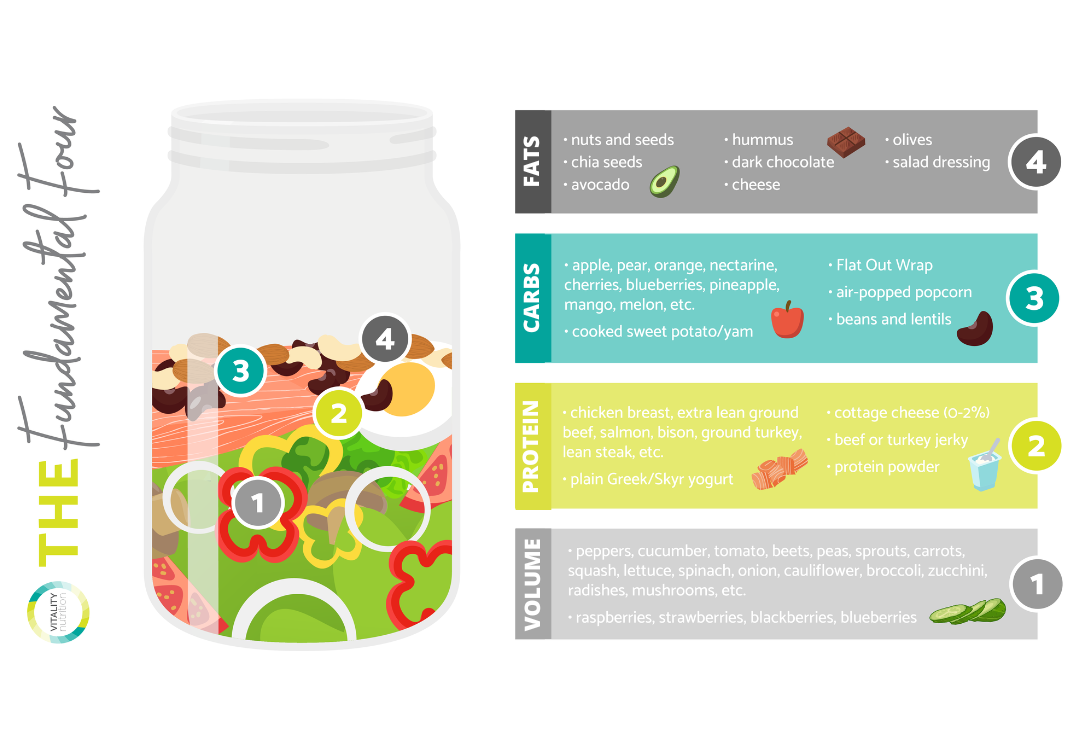
For example:
- Cereal (carbohydrate) can be balanced by enjoying it as a parfait with plain Greek yogurt (protein), berries (fibre), and nuts or seeds (fat)
- Toast (carbohydrate) can be balanced by pairing it with eggs (protein), tomatoes (fibre), and avocado (fat).
- Pasta (carbohydrate) can be balanced by pairing it with a meat sauce (protein), vegetables in the sauce or a side salad (fibre), and a sprinkle of parmesan cheese (fat).
- An apple (carbohydrate) contains fibre and could be further balanced by adding cheese, almonds, or peanut butter which offer both protein and fat.
Each person has a unique carbohydrate tolerance based on genetic factors, body composition, physical activity, chronic conditions, and more. Working one-on-one with a Registered Dietitian can help you to customize your carbohydrate portions and how you support the carbohydrates with protein, fat, and fibre to keep your energy levels stable!
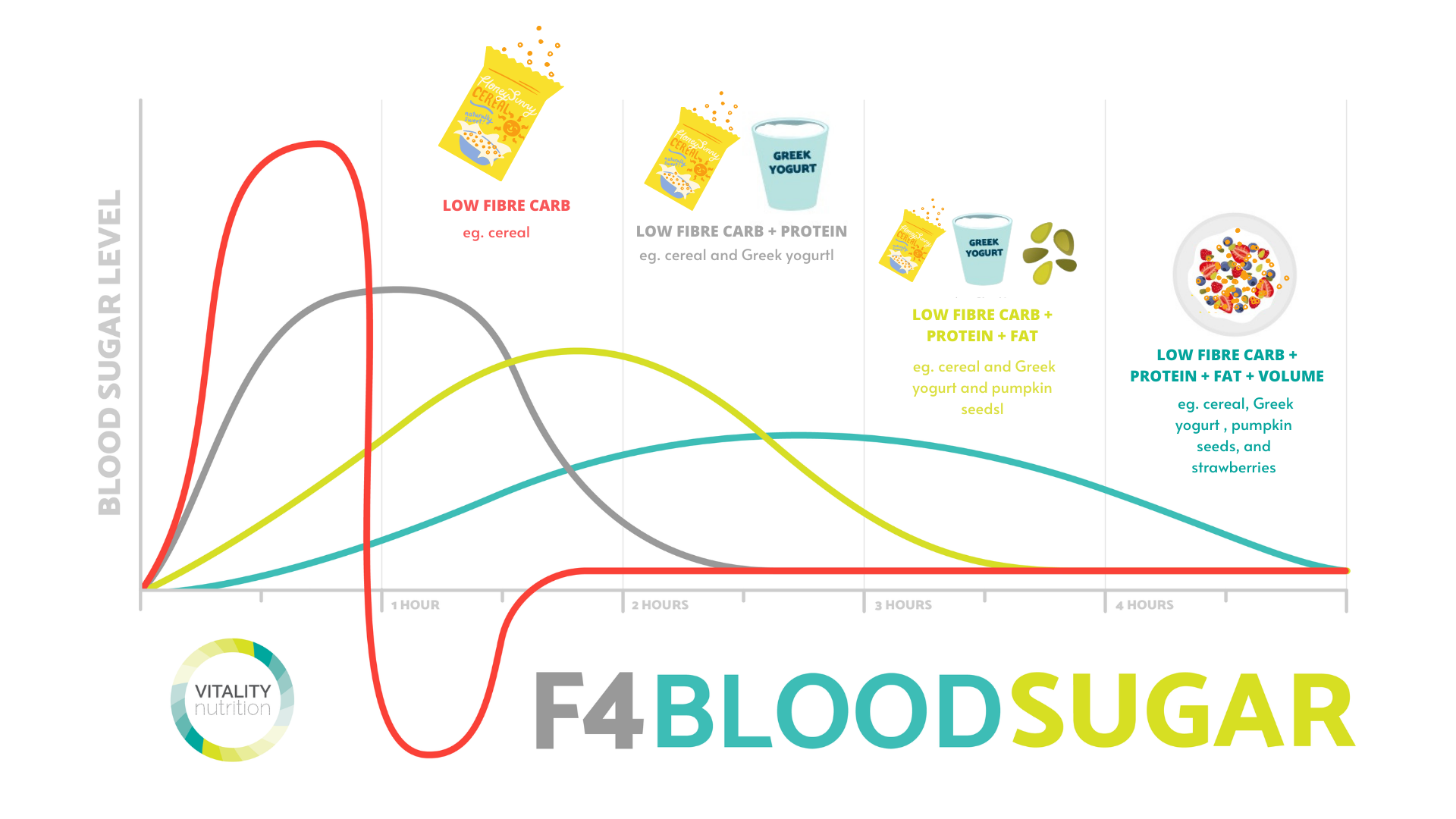
#2. The gaps between your meals or snacks are >5 hours
As Registered Dietitians, we’ve found that a well balanced meal with adequate carbohydrate, protein, fat, and fibre will keep most people energized for 3-5 hours. After this time frame, it is common to experience low blood sugar. For this reason, the nutritionists at Vitality Nutrition recommend leaving no longer than 5 hours between meals. For example, if you eat lunch at noon and plan to have dinner at 6pm then it would be wise to plan an afternoon snack to keep your energy (ie. blood sugars) supported through the day.
Examples of energy supportive (ie. blood sugar supportive) snacks:
- Cheese and turkey sticks with an apple
- Greek yogurt with berries and seeds
- Tuna with crackers and vegetables
- Roasted chickpeas with vegetables and hummus
Notice that these snacks include a carbohydrate source paired with protein, fat, and fibre sources. The carbohydrate is important to supply a source of glucose and the protein, fat, and fibre time-release the glucose to avoid blood sugar spikes and crashes.
#3. You aren’t having any carbohydrate at the meal
Having too little carbohydrate at a meal can negatively impact energy as carbohydrate is needed to offer the glucose that gives rise to blood sugar levels. As Registered Dietitians, we refer to carbohydrates as a “Goldilocks situation”. By this we mean that there is a sweet spot of “not too little” or “not too much” as experienced in the classic fairytale of Goldilocks and The Three Bears. As described in a previous section, too much carbohydrate can cause reactive hypoglycemia but inadequate carbohydrate does not provide a source of glucose to be used as energy.
Determining the amount of carbohydrate to plan in your meals is best achieved by working 1:1 with a Registered Dietitian. Carbohydrate tolerance varies based on individual factors including activity level, body composition, genetics, chronic conditions, and more.
#4. You aren’t eating enough
Calories are units of energy your body uses to function. When you don’t eat enough calories, you’re likely to feel tired most of the time. Calories may be restricted intentionally (eg. to lose weight) or unintentionally (eg. stress, busy lifestyle, appetite suppression from medication, and more). Ensuring that you are eating enough to support your body, your lifestyle, and your exercise routine is key to feeling energized throughout the day. If you are unsure of how much to eat or are struggling with factors impacting appetite then it is important to reach out to a Registered Dietitian for custom planning and individualized support.
#5. Your eating schedule is constantly changing
Eating irregularly can disrupt our biological clock which is known as our circadian rhythm. Our circadian rhythms tells us when to sleep, wake up, and perform activities (eg. exercise). When we are consistent with our eating, sleeping, and movement patterns our body releases the appropriate hormones in response. Chrono-nutrition speaks specifically to nutrition and is the syncing of when we eat! Planning your meals and snacks at consistent times during the day is a proposed strategy to improve your energy during the day and sleep better at night! For example, eating breakfast, lunch, snack, and supper around the same time each day.
#6. You are deficient in a micronutrient
Micronutrient deficiencies can negatively impact energy levels. For example, a lack of iron, folate and vitamin B12 can lead to anemia. Anemia is a condition in which there is a reduced number of red blood cells or hemoglobin concentration which causes fatigue and weakness among other symptoms. Other vitamins of concern for energy include the collection of eight B vitamins which contribute to the production of energy in the body.
Vitamin supplementation or intentional food sourcing may be of importance for individuals experiencing low energy due to a deficiency. Consulting with a doctor or Registered Dietitian is essential to ensure that your micronutrient requirements are being met through food and/or supplements.
#7. You aren’t hydrated
Staying hydrated prevents fatigue and tiredness by ensuring nutrients and oxygen are carried to cells so that energy (ie. ATP) can be produced. The amount of water you drink is individualized based on body composition and fluid losses from exercise, respiration, climate, and sweat rate.
As Registered Dietitians, we’ve found a supportive fluid baseline to range from 2-4L per day with at least 500mL of an additional fluid for each hour of sweating (eg. exercise or spending time outside in a hot or humid client). It’s important to note that hydration status is also impacted by the balance of electrolytes in the body (ie. sodium, potassium, calcium, magnesium, and chloride). Consuming electrolyte rich foods or supplements may be supportive in some instances to assist in cellular hydration! With both fluid and electrolytes in mind, consider these three tips to optimize your hydration:
- Don’t let yourself get thirsty: The best indicator that you need to drink water? Thirst! If you feel thirsty, it’s your body’s way of saying it needs more fluids. Make it a priority to drink water with and between meals to support hydration throughout the day. Other signs of dehydration include altered mood, dry eyes, headaches or dizziness, or muscle cramping.
- Check your urine color: While there is no magic number of exactly how much fluid your body needs daily, the color of your urine is a helpful indicator to determine your hydration status. If your urine is pale yellow as shown on the infographic below, you’re likely drinking adequate fluid. If you are constantly peeing colorless urine you may be drinking too much fluid and if your pee is bright or dark yellow you likely need to increase your fluid intake.
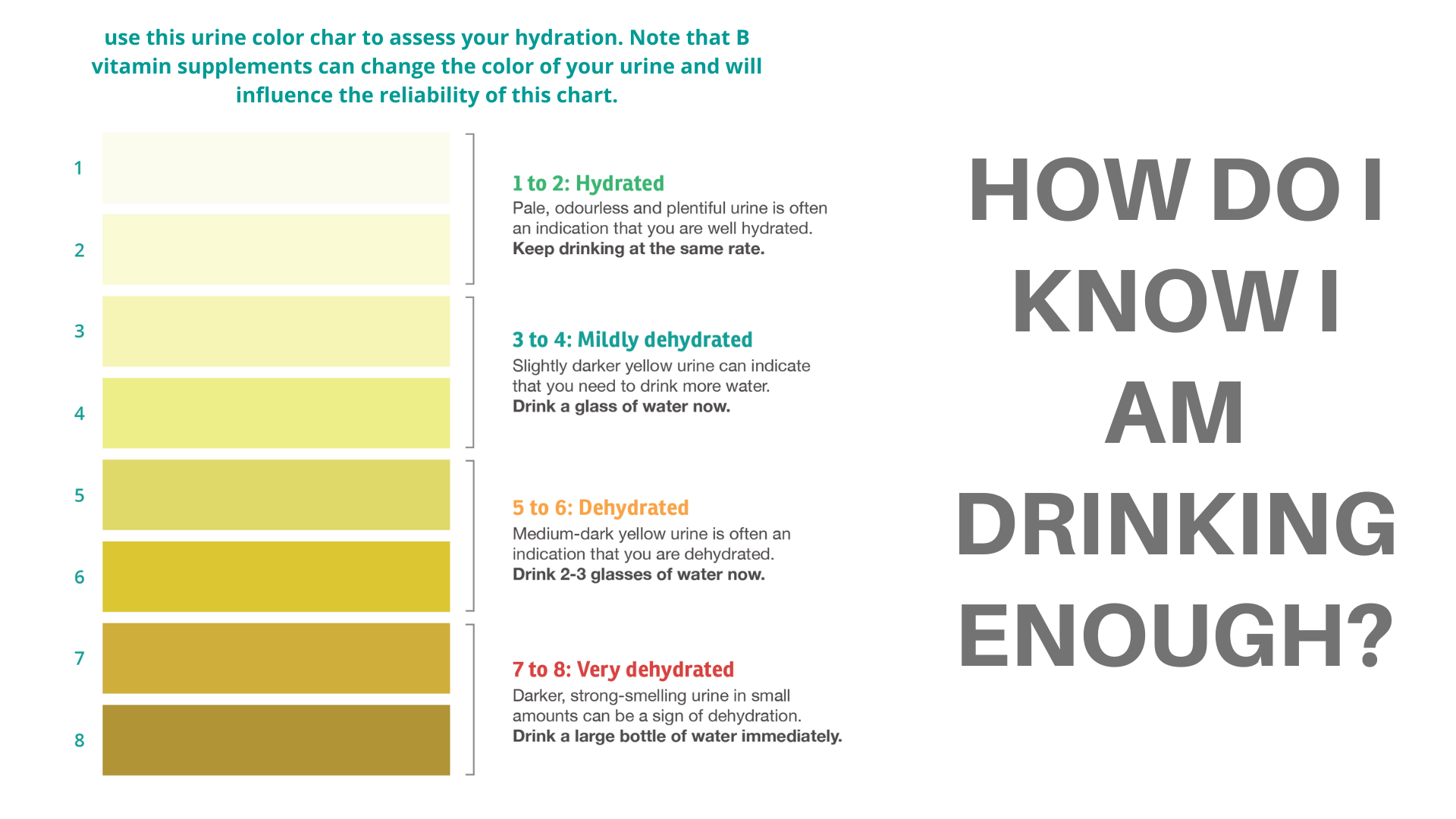
3. Prioritize vegetables and fruits: Our fluid intake can be achieved beyond drinking water - choosing fluid-rich foods like fruits and vegetables is an effective way to support hydration! In addition to having a high water content, fruits and vegetables contain electrolytes that assist in maintaining fluid status in the body. Aim to build a variety of colors of fruit and vegetable into your menu plan to obtain fluids and unique electrolytes. For example, green produce like broccoli and spinach for calcium and magnesium and yellow produce like bananas and potatoes for potassium.
PART 2: LIFESTYLE FACTORS
#1. You aren’t sleeping for at least 7 hours
For most adults, at least seven hours of sleep is required for proper cognitive and behavioral functions. When one sleeps, the brain reorganizes and recharges itself, and removes waste byproducts which have accumulated throughout the day. Creating time to achieve the sleep you need is a key lifestyle consideration to improve your energy levels. Beyond creating the time to sleep, you may explore other sleep supportive habits like adopting a relaxing sleep routine, dimming the lights before bed, eliminating screen time before bed, and creating a cool and dark sleep environment.
#2. You aren’t capturing enough deep sleep
We discussed the importance of getting enough sleep (ie. at least 7 hours) but the quality of your sleep influences your energy levels, too. While you rest, your body goes through different stages of the sleep cycle. Deep sleep, for example, is the stage of sleep you need to feel refreshed when you wake up in the morning. Sleep specialists believe that deep sleep - or slow-wave sleep - is an impactful sleep stage where the body renews and repairs itself. In the Podcast episode that accompanies this blog post, the Registered Dietitians at Vitality Nutrition explore specific strategies to enhance the amount of deep sleep you capture each night. You can listen here to learn more!
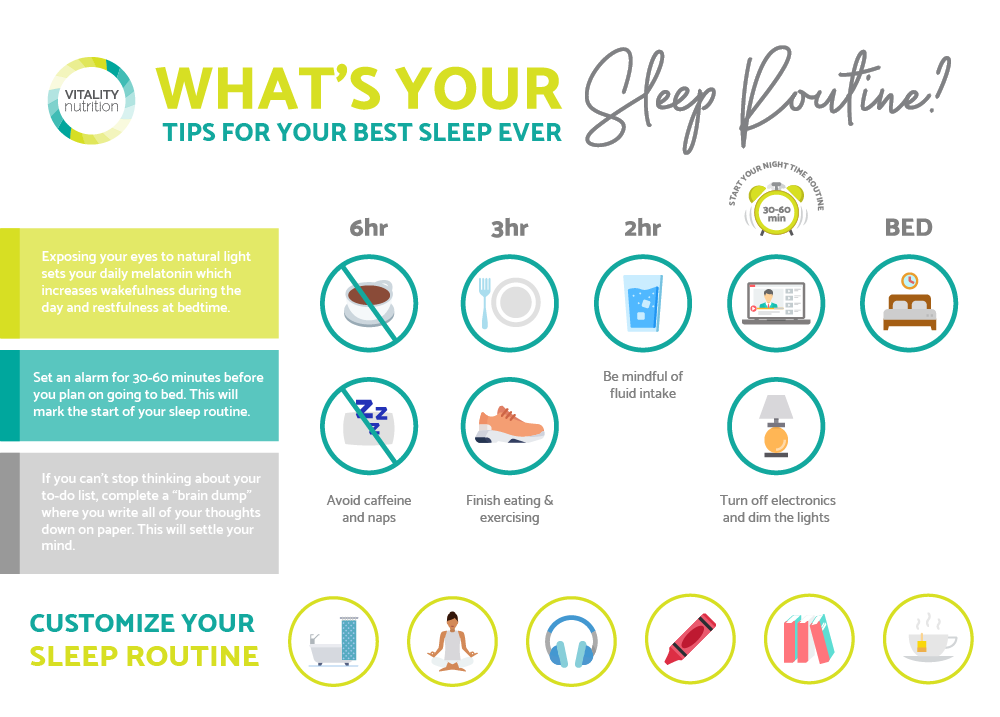
#3. You aren’t exposing your eyes to natural light during the day
The light and dark cycle of the sun has a powerful effect on the circadian clock which influences alertness and sleepiness. Our body's circadian clock responds to light as a signal to be awake and darkness as a signal to fall asleep. As Registered Dietitians, we recommend that clients who are looking to increase day-time energy prioritize time outside to feel more alert and awake. Some tips to capture more day-time light:
- Open your blinds first thing in the morning to let natural light shine into your home (this can be tricky on the short, winter days!)
- Go for a walk outside for 10 minutes or more after the sun has risen to assist in supporting the natural rhythm of wakeful hormones (ie. cortisol) that will make you feel alert
- If possible, work in a well lit area with natural light through a window or a wake light or light therapy lamp.
#4. You aren’t exercising regularly
As many people can attest, exercise can offer a dose of feel-good endorphins that offer an immediate increase to energy. Furthermore, exercise boosts oxygen circulation in the body which is essential in the production of energy. Over the long-term, exercise can induce cellular changes to the body by signaling the production of mitochondria inside your muscle cells. Mitochondria are known as the powerhouses of cells, because they create fuel out of glucose from the food you eat and oxygen from the air you breathe. Having more mitochondria increases your body’s energy supply!
As Registered Dietitians, we believe that it is important to highlight that feeling energized from an exercise routine also requires that you are providing your body with what it needs to recover from exercise including adequate nutrition, hydration, rest, and sleep. If you are looking to reach specific performance, fitness, or body composition goals through exercise we recommend working one-on-one with a Registered Dietitian to create a customized nutrition plan to support these endeavors.
#5. You aren’t moving your body throughout the day
A regular exercise routine, as discussed, is an impactful strategy to improve daily energy. However, spreading physical activity throughout the day is another consideration when it comes to improving energy and vigor. One study found that introducing short bouts of activity during the workday of sedentary office workers is a promising approach to improve overall well-being at work. As Registered Dietitians, we encourage clients in sedentary work environments to schedule 5-10 minutes walking breaks if possible to improve day-time energy.
PART 3: OTHER FACTORS
#1. You aren't socializing
As Registered Dietitians, we recognize that wellness goes beyond nutrition. Social connections are incredibly important for maintaining good health. Some research even indicates that having stronger social support can protect our physical and mental health.
Scheduling social time with friends or family or enjoying a hobby or sport to get involved with a community can be an effective way to boost energy. Socializing may also include scheduling meals with others whether that be colleagues, friends, or family. Even if the meal we are choosing isn’t the ‘healthiest’ item we are embracing the opportunity to connect with others and recognizing that this opportunity offers health benefits beyond the nutrition breakdown of the meal itself.
#2. Your environment is bringing you down
The environments that we work and live in impact our energy levels. When working one-on-one with our nutrition coaching clients we often discuss how to build an environment that supports their unique goals. This may include how to build a supportive food environment that is well stocked with energizing, nutritious foods. However, the environment conversation can extend into noticing how the design of our physical spaces impacts energy. For example: natural light, bright and energizing colors, an organized space, decor, or plants are common strategies to improve your experience in the space. Reflect on the environments that you spend the most time in to determine whether strategic adjustments could improve your energy!
#3. You aren’t tracking and understanding trends in your menstrual cycle
The four phases of the menstrual cycle impact on energy levels and understanding your individual cycle trends is crucial for nurturing your physical and mental health.
- Menses: The first day of your period is considered day one of your menstrual cycle. Many women find that they are more tired in this phase due to low hormone levels.
- Follicular phase: This phase of your cycle begins on day one of your cycle and extends to ovulation. Rising estrogen levels can cause an increase in energy for many.
- Ovulation: Ovulation is the release of an egg which occurs around day 14 of a typical 28-day cycle but may vary based on your unique cycle length. Estrogen and testosterone levels peak during ovulation and many women find themselves feeling more energetic than usual.
- Luteal Phase: This phase refers to the time between ovulation and menstruation where a structure from the egg called the corpus luteum produces a hormone called progesterone. Both estrogen and progesterone rise throughout the luteal phase before dropping off at the mid-way mark which is around day 21 for a typically 28-day cycle. If the decrease in progesterone levels is rapid, many women experience more noticeable PMS symptoms including fatigue.
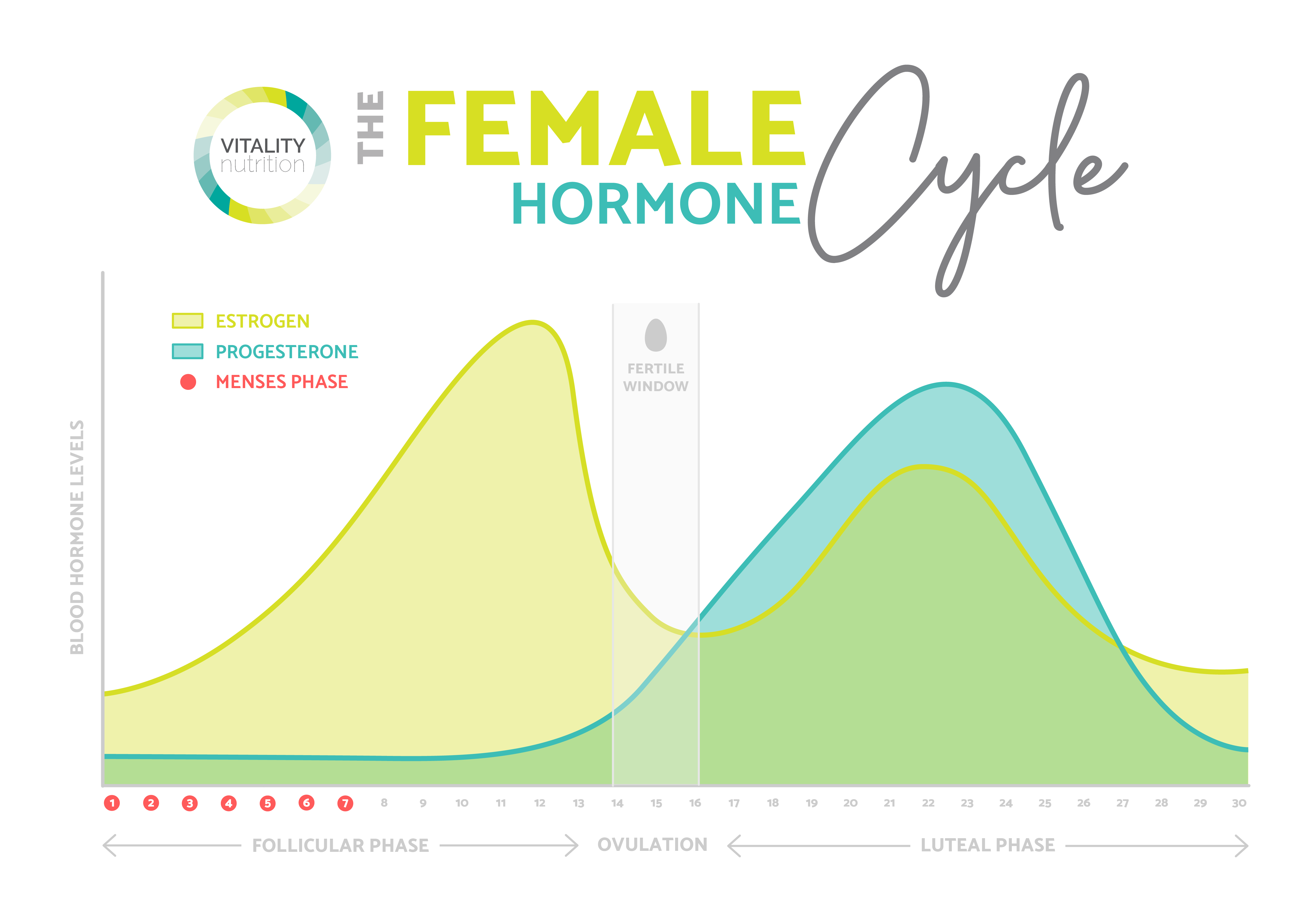
Tracking your cycle is a supportive strategy to understand cyclical changes in energy levels. While extreme fatigue or PMS may call for evidence-based strategies to balance hormones, it is also important to offer your body compassion and understanding as you move through natural shifts in energy across the cycle.
BOTTOM-LINE
If you find yourself reaching for a second cup of coffee in the afternoon then you certainly aren’t alone. While it is only natural to feel fatigued from time-to-time, there are many supportive habits you can adopt to reduce fatigue and boost your energy levels. The habit recommendations featured in this blog post and accompanying podcast can increase your energy levels and contribute to other aspects of your health. Click here to download our free dietitian-approved check-list and choose a habit to get started in adjusting your nutrition and lifestyle patterns for better energy!
Ready to bring the evidence-based nutrition support of our Registered Dietitians into your kitchen?
Hungry for more?
Get recipes, tips, and updates from the Vitality Nutrition team straight to your inbox!
Don't worry, your information won't be shared.

